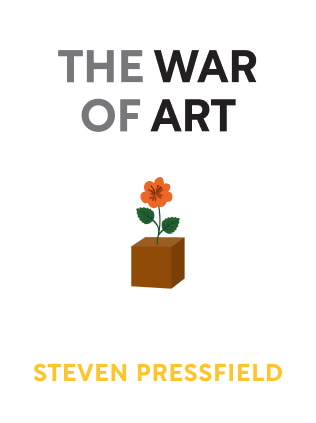

This article is an excerpt from the Shortform book guide to "The War of Art" by Steven Pressfield. Shortform has the world's best summaries and analyses of books you should be reading.
Like this article? Sign up for a free trial here .
Do you have artistic integrity? Why is it important to assess your motivations for doing art? How can you achieve artistic integrity?
Having artistic integrity is where you engage in art for the right reasons. Rather than doing so for money or esteem, you should engage in art because it’s your true calling and it’s what you love doing. Ultimately, having artistic integrity will improve the quality of your work.
Keep reading for more about artistic integrity.
What Is Artistic Integirty?
In order to understand what artistic integrity is, it’s important to know the difference between a hierarchical artist and a territorial artist. Here are the key differences.
The Hierarchical Artist
It’s easy to define yourself based on hierarchy. You’ve been doing it since childhood. As a kid, you found a band of friends, and everyone knew who the leader, the mediators, or the followers were. You knew your place in this group and defined yourself by it. You grew up to be a leader, a mediator, or a follower. Cues from the social and public spheres reinforced this identity with the message that others’ opinions mattered.
The problem is that hierarchy only works in small clusters. High school is a small pond, so rankings abound, and everyone knows where they stand, from quarterback to the head of the math club. But in real life, this type of hierarchy can’t function. Metropolitan cities, universities, and corporations are too big to structure everyone in this way. When you define yourself based on hierarchy, you lose your distinction within these larger groups and become lost. The psychological effects of this loss of identity are severe, especially for an artist.
Hierarchy is death for the artist. It narrows your scope regarding the work. You strive to find your place within your field, so you measure yourself against those achieving success. You also cut yourself off from those below you. Your worth becomes entwined with where you land within that group of artists. You lose the ability to see the larger tribe and make positive connections. You try to shape yourself according to the rank you wish to become.
When you look to the outside world to define your worth, you will never be content. Look at Vincent Van Gogh. He was fully engaged with his Self and pursued his calling as a professional. But the world didn’t recognize his art as worthy, and he suffered psychologically.
When you look outward instead of inward, you stop doing the work for the sake of the work. You approach every connection through the lens of how it can enhance your position. And worst of all, you become a hack.
A hack is someone who shapes their art to improve their ranking within the hierarchy. You write, paint, or develop your ideas based on what you believe people want to see and will accept. You become afraid of creating what is in your heart because you fear it won’t be received well. You force yourself to travel down an unauthentic path, and you and the work suffer.
You might achieve financial success as a hack because American culture loves a good panderer. But you’ll have sacrificed your muse and not fulfilled your calling. Therefore, the success will only be external and the work less than what you’re capable of.
Example: Steven Pressfield
Steven Pressfield, author of The War of Art, struggled as a screenwriter in Hollywood for many years. To his and his agent’s dismay, his next big idea was a book. They both knew that first novels took years to finish and were hard to sell. Plus, his novel was about golf, not the hottest topic in the world.
But Pressfield felt the story in his heart and decided to write what he thought was interesting regardless of how it would be received. His first novel, The Legend of Bagger Vance, became a success as both a book and adapted film.
He reasons his success came from writing what he thought was worthy and leaving the fate of the work up to the gods.
The Territorial Artist
Just like animals, humans have certain turfs. You feel more comfortable on your home turf than you do in a foreign place. You likely feel stronger when surrounded by your family than a group of strangers. Your turf is your territory, and you roam your territory freely and confidently. As an artist, you also have a specific turf. If you’re a painter, it’s a canvas. If you’re a writer, it’s a computer screen. If you’re a scientist, it’s a laboratory. You belong there and receive many gifts from the territory in return.
Territories fill your soul with sustenance. And you don’t need anyone else to feel sustained. Think about your home. Your home provides comfort with or without anyone else in it. You’ve put in the work to make it your home, and it rewards you with warmth and stability.
Putting in the work is the key to creating a territory. You can only claim a territory you’ve worked for. You might want to claim a home as your territory, but if you don’t decorate it or put any work into making it yours, it won’t be. It will just be a building with four walls and a roof.
You can’t simply dwell in a place and hope to receive anything from it if you do nothing in it. A territory only gives back what you put into it. (Shortform example: Think of a territory as interest in a bank account. The more money you put in, the more interest you’ll accrue. If you open an account and never put any money into it, you can’t expect to make any interest in return.)
The territory of your art is where you connect with your muse. If you try to claim your territory without doing the work or, worse, try to create a shortcut in the work to serve an external purpose, you anger your muse. As a result, your muse will not bestow the sustenance you desire.
When you work within your territory and fulfill your end of the arrangement, you show respect to the muse. You invite their mysterious force in and promise to serve as a patient servant. The muse, in turn, gives back by providing the inspiration you need to bring your work to completion.
A territorial artist does the work for the sake of the work. From this vantage, you also harness the energies of your higher consciousness. If you do the work for some external reward or recognition, you’re working toward a hierarchical goal. You are presuming to know more than your muse and higher mind because you think you can manipulate the work for profit. This presumption is an affront because you’re allowing your Ego to infiltrate their territory. As a result, you will receive no guidance.
Do You Have Artistic Integrity?
The distinction between the two identities comes down to motivation. To know which foundation you’re working from, ask the following questions:
If you’re suffering psychologically, what do you do to make yourself feel better?
- If you call a bunch of friends to receive reassurance, you’re more hierarchical.
- If you turn to the work for solace, you are territorial.
If you were the last person on Earth, would you still create your art?
- If your creations lose meaning because there’s no one to validate your work, you’re hierarchical.
- If you gain sustenance from the act of doing the work without accolades, you are territorial.
Working from a territorial perspective means truly doing the work in order to fulfill your calling. A major advantage of this foundation is that it banishes fear. When you work because it is part of who you are and commit to the work, you can never fail. Claim your territory through work, and intruders have no choice but to move on to unclaimed land.
Answer the following questions to find out if you have artistic integrity:
- What type of activities fill your soul?
- Do you put in work every day on those activities, or do you dabble when the mood strikes?
- Would you find the work meaningful if no one was around to admire it? Why or why not?
- What is your territory, and what are the specific steps you must take to claim it? List three. For instance, if your territory is science, what activities do you need to perform to become a scientist?

———End of Preview———
Like what you just read? Read the rest of the world's best book summary and analysis of Steven Pressfield's "The War of Art" at Shortform .
Here's what you'll find in our full The War of Art summary :
- Why creative people feel resistance when approaching their true work
- How to break down the wall that holds you back from reaching your potential
- How to tap into your creative power and honor the genius you were born with






